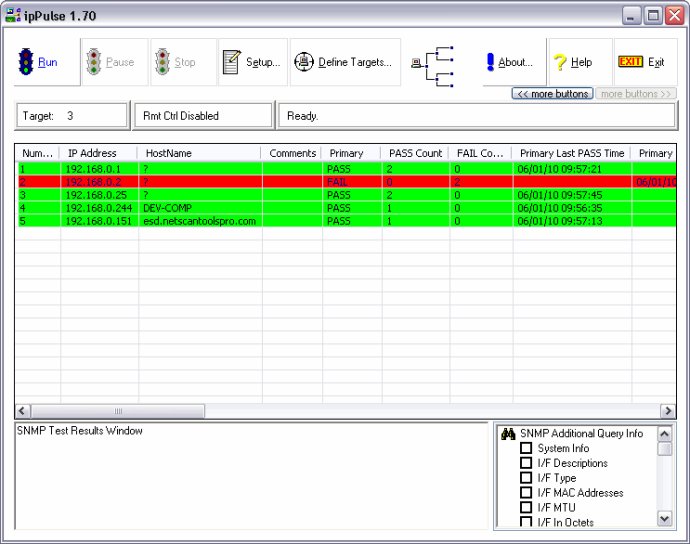ipPulse is a monitoring tool that tracks the status of connected devices on any IP network. It generates alerts through audible messages, email, logs, and web for any failures. ipPulse is useful for monitoring IPv4 connected devices on a network.

The software alerts users to failures using a variety of techniques, ranging from audible messages to email and logging. It supports a comprehensive list of target hosts that can be entered either as hostnames or IP addresses, which can be imported from a text file. The list is polled on a cyclical basis with full control over the list cycle timing parameters.
The software supports a primary and secondary test and standard Ping ICMP Echo Requests/Replies, which are used only in the primary test. TCP Port numbers for TCP connect tests are assignable on a per-node basis, which can be used in either the primary or secondary test. In addition, an optional Web Server Page Test retrieves a web page, checks the web server status code, and if necessary, looks for a specific character string.
Users can also use SNMP v1 or SNMP v2c as a secondary test by requesting MIB2 OID interfaces.ifTable.ifEntry.ifOperStatus for every interface found on the target node. Community names can be assigned on a per-node basis, and SNMP queries can be made for obtaining more extensive data from the target host. The software includes a number of OID presets and 12 user-defined OIDs, such as obtaining MAC addresses for every interface from an SNMP enabled host.
Multiple alerts and logging options are available to users. Alert options include beeping the computer, playing a wave file, notifying someone by email, or sending a notification email to a cell phone. Logging options include logging all test results to a text file, logging only errors to a text file, or logging errors to a dynamically created HTML page. Users can use any combination of logging options, and alerts are issued upon failures using user-defined criteria.
Changes from a FAIL state to a PASS state can now generate email messages, providing users with improved functionality and convenience. Overall, ipPulse is a powerful connectivity and device monitoring tool that provides users with an efficient and effective solution for monitoring network connectivity and status of IP connected devices.
Version 1.92: Added HELO/EHLO domain field for better compatibility with email servers. Updated email section of documentation.